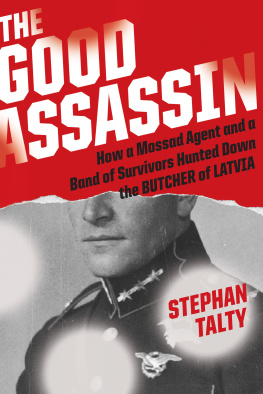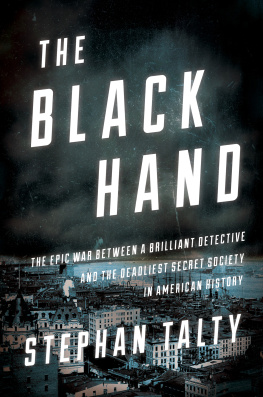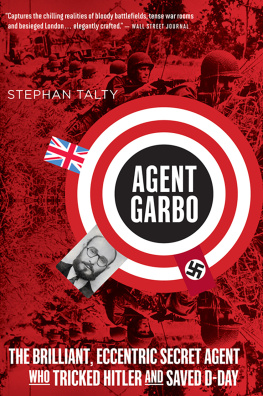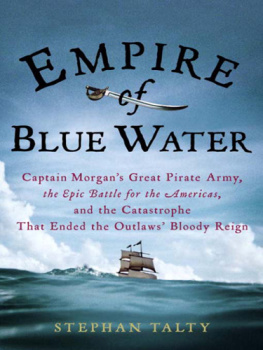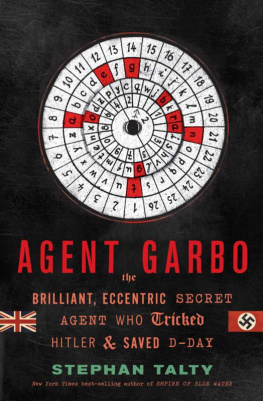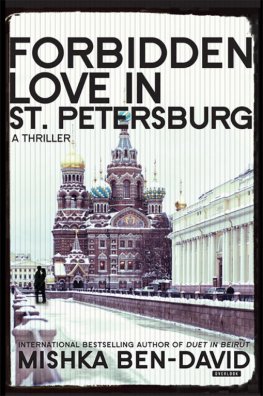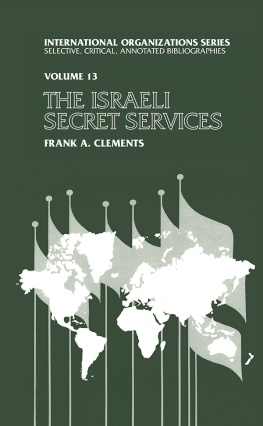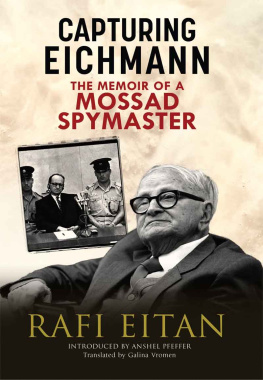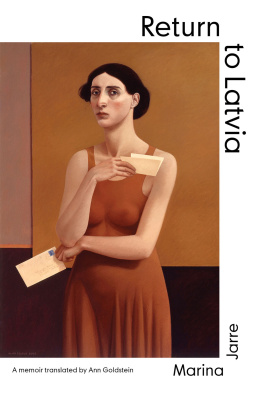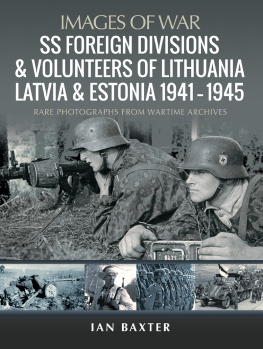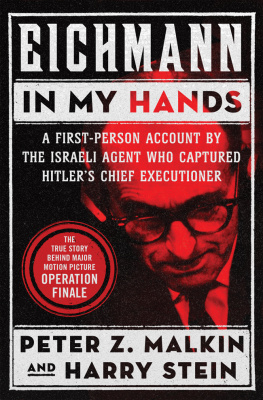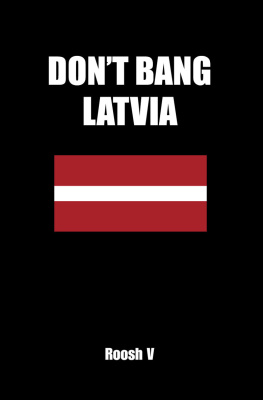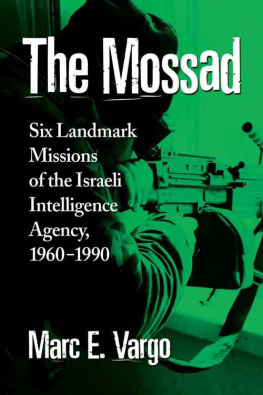Copyright 2020 by Stephan Talty
All rights reserved
For information about permission to reproduce selections from this book, write to or to Permissions, Houghton Mifflin Harcourt Publishing Company, 3 Park Avenue, 19th Floor, New York, New York 10016.
hmhbooks.com
Library of Congress Cataloging-in-Publication Data
Names: Talty, Stephan, author.
Title: The good assassin : how a Mossad agent and a band of survivors hunted down the Butcher of Latvia / Stephan Talty.
Other titles: How a Mossad agent and a band of survivors hunted down the Butcher of Latvia
Description: Boston ; New York : Houghton Mifflin Harcourt, 2020. | Includes bibliographical references and index.
Identifiers: LCCN 2019027262 (print) | LCCN 2019027263 (ebook) | ISBN 9781328613080 (hardcover) | ISBN 9781328618856 (ebook)
Subjects: LCSH : Medad, Jacob, 19192012. | Cukurs, Herbert, 19001965Assassination. | Israel. Mosad le-modiin ve-tafkidim meyuhadim. | NazisBrazil. | NazisUruguay. | War criminalsLatviaRga. | Fugitives from justiceUruguay. | JewsPersecutionsLatviaRga. | Holocaust, Jewish (19391945)LatviaRga. | Secret serviceIsrael.
Classification: LCC D804.L35 T 35 2020 (print) | LCC D804.L35 (ebook) | DDC 364.15/1092dc23
LC record available at https://lccn.loc.gov/2019027262
LC ebook record available at https://lccn.loc.gov/2019027263
Cover design by Mark R. Robinson
Cover photograph courtesy of the National Library of Latvia
Author photograph Nathacha Vilceus
v2.0420
For Karen, Suraiya, and Aman
Prologue
The Apartment on the Avenue de Versailles
M IO WALKED INTO THE LOBBY of the building on the Avenue de Versailles and called out Bonjour! to the concierge through her tiny window. Not waiting for a response, he went quickly up the marble stairs. Puffing by nowhe was a bit out of shapehe reached the wooden door of Yarivs apartment and pressed the bell. He was confident he hadnt been followed; hed stopped in front of the gigantic Radio France building a few blocks away to check for tails. It would have been unfortunate to bring one to a meeting with Yariv, who was touchy about such things.
The door opened and Yosef Yariv, the head of Caesarea, the special operations arm of Mossad, nodded at Mio. With his honking beak of a nose and thick pelt of unruly hair, the forty-year-old Yariv resembled a predatory desert bird. Now his piercing blue-gray eyes studied his friend.
Im glad you made it, he said.
Mio said nothing, only nodded and walked past. Yariv locked the door, then turned. From this moment onwards, he said, your name is Anton Kuenzle. Youd better start getting used to it. Mio showed no reaction; he was an introvert, raised in Germany as a Jew in the early thirties, which encouraged, if not required, certain kinds of masks to be worn. And besides, it was Mios stock-in-trade to become different people, sometimes for a few days, other times for much longer. Inside Mossad, where he was one of the great, perhaps the greatest, undercover operatives, he was known as the man with the hundred identities. Back home in Israel, his family lived in a house that sat behind a steel gate, through which the agency sent a car every time he was leaving on an assignment. His son would later say that when the car drove off and they heard the loud clang as the gate swung closed behind it, they knew their father had already transformed into another person. Calling it a cover identity wasnt quite right; when Mio assumed a new persona, it didnt cover anything, let alone his real personality. It was his real personality, for exactly the length of time he was required to inhabit it. A fellow Mossad agent once claimed, I swear to God, if you woke Mio in the middle of the night, he would immediately begin speaking in the language of his false persona. On those days when he was driven to the airport, he never looked back to wave to his children because, in his mind, he had no children.
The two walked ahead into a small guest room. Another operativeMio called him Michael, though that wasnt his real namesat at a small table with cups and saucers and a pot filled with coffee. A fairly thin file sat next to the cups. Mio nodded at Michael and took one of the empty chairs. Yariv followed suit. He looked at the other two, his eyes cool.
You must be wondering why I summoned you here, he said.
The two men said nothing.
Well, it all begins with the final confirmation we received about a Nazi war criminal who lives in one of the South American countries.
Michael looked at Mio, who glanced back, remaining silent. Yariv explained that in eight months, on May 8, 1965, the world would mark the twentieth anniversary of the end of World War II in Europe. German politicians and ordinary citizens were calling for an end to the hunt for Nazi war criminals and for a statute of limitations to be applied to their crimes. Mio didnt react, but, as someone who avidly read the newspapers, he must have seen the headlines. Germany was preparing to enforce an 1871 law that mandated a twenty-year limit on murder prosecutions. Two other amnesties, for assault and for manslaughter, had gone into effect in 1955 and 1960 with little protest around the world. Charging any Nazi officer or soldier with those crimes was now forbidden inside Germany. But soon the killers themselves, the very worst of the worst, the men and women whod physically pulled the triggers on the machine guns and the rifles and the pistols and smashed in the heads and strangled and bludgeoned their portion of the six million, could emerge from their hiding places and walk free in the sun. It seemed utterly fantastic, but there it was.
The statute, Yariv said, was popular in West Germany. Every poll showed solid majorities in favor of it, and the governing party, the Christian Democratic Union, had thrown its weight behind the law. Only the Bundestag, the feisty German parliament, could delay the amnesty by passing a bill that would push the deadline a few years into the future, allowing the remaining unindicted National Socialist murderers to be found and prosecuted for at least a short time longer. But Yariv told Mio and Michael that Israeli leaders were increasingly pessimistic about this possibility. The chances of accepting this proposal are small... There is no guarantee that the politicians are prepared to extend the Statute of Limitations, not by four years, not by ten years, and, for that matter, most probably not at all.
Mio noticed his friends voice starting to rise in the quiet room, though his face showed no change in expression. It is absolutely inconceivable, Yariv said, that tens of thousands of Nazi war criminals, who never paid for their heinous crimes, should now be able to crawl out of their hiding holes and spend the rest of their lives in peace and tranquility... Its been only twenty years since the release of the survivors of the death camps, and we owe it to them, and to the six million who did not survive and are unable to avenge themselveswe must thwart this shameful process.
Israeli prime minister Levi Eshkol and his intelligence chiefs had secretly decided on a mission. A killing was required, a certain kind of killing that would reveal the Nazi monsters whod escaped punishment and publicize the nature of their crimes. Unlike Mossads kidnapping and subsequent execution of Adolf Eichmann four years earlier, there would be no trial, no lawyers or judges, no legal niceties, no essays by Hannah Arendt in The New Yorker. And the operation had to be completed before the vote in the German parliament, currently scheduled for sometime in the spring.
The Nazi whose turn has come, Yariv said, is Herbert Cukurs.
It was a Latvian name; Yariv pronounced the C in Cukurs correctly, like Ts,

